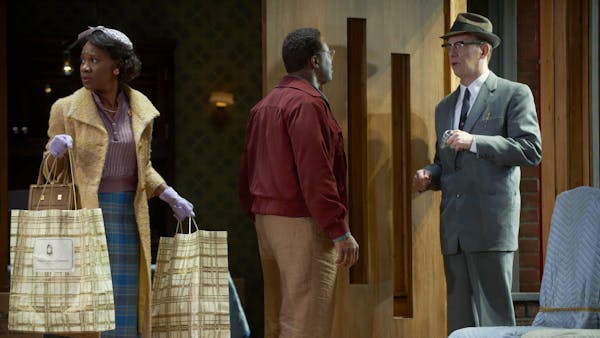Playwright Bruce Norris employs word play and perfectly calibrated dialogue with such cheeky elegance that it's easy to say he's got a great play in "Clybourne Park," which opened at the Guthrie Theater on Friday. Norris slices up the clumsy American doctrine of polite avoidance used when talking about race.
But director Lisa Peterson's taut and insightful production finds the loose thread in Norris's neatly woven comedy and by tugging just a bit on that thread,unravels something deeper than an exchange of coded (and not so coded) insults. She does so with a cast that is uniformly crisp and responsive, decked out distinctly in two eras by David Zinn's costume scheme.
Norris begins with a riff on Lorraine Hansberry's "A Raisin in the Sun," with white residents of a 1959 Chicago neighborhood contemplating what it means to have an African-American family move in.
Russ (Bill McCallum) and Bev (Kathryn Meisle) seem content with their decision to move to the suburbs. He's as exciting as yogurt, she as giddily vacant as the living room they are abandoning.
Their conversation avoids any real emotion because their sturdy brick home (designed with perfect dimensions by Rachel Hauck) is a tinderbox of emotion.
Soon, the local pastor (Peter Christian Hansen) and neighbors Karl and Betsy (Jim Lichtscheidl and Emily Gunyou Halaas) stop by to visit. Karl has an agenda: what will happen to the neighborhood?
Norris makes this rather conventional conceit fresh and funny. Karl grills Bev and Russ's maid (Shá Cage) and her husband (Ansa Akyea) about whether they ski. They don't. "And this is my point!" Karl says triumphantly, having found the reason why blacks would not be comfortable in this neighborhood.
But of course neighborhoods are not defined by such trivia, and Peterson orchestrates the act with an eye on the unseen evil. The rising volatility in McCallum's Russ illustrates the erosion of comity that existed before any home was sold. With Meisle's Bev helpless to stop him, McCallum excoriates his neighbors for the way they shunned his son, who had returned home as a tarnished soldier.
The second act has less to say. Fifty years later, a white couple wants to knock down this now-shabby house (an amazing intermission conversion) and gentrify with a McMansion. A neighboring black couple opposes the plan because, they say, it would affect the character of the neighborhood.
Civility breaks down, a la "God of Carnage," with offensive jokes lobbed as Molotov cocktails. Cage's character (the same actors appear in different roles in the two acts) redeems the invective with her observation that buyers should respect the memory in the bones of the house. Is that code, or does she have a point?
This is the thread that Norris leaves for us to pull on. Once we've finished laughing at a clever and neatly constructed play, he are left to wonder about communities as living organisms that threaten themselves with their own suspicions, their own inability to adapt, to dance along that treacherous boundary between tradition and renewal.
Graydon Royce • 612-673-7299
In heated western Minn. GOP congressional primary, outsiders challenging incumbent

Minnesota Sports Hall of Fame: A class-by-class list of all members

This retired journalist changed professional wrestling from Mankato

